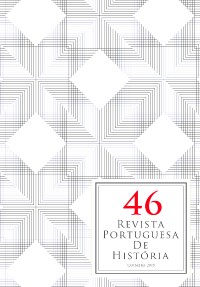Please use this identifier to cite or link to this item:
https://hdl.handle.net/10316.2/38200| DC Field | Value | Language |
|---|---|---|
| dc.contributor.author | Faísca, Carlos Manuel | - |
| dc.date.accessioned | 2015-12-07T11:40:52Z | |
| dc.date.accessioned | 2020-10-05T00:48:17Z | - |
| dc.date.available | 2015-12-07T11:40:52Z | |
| dc.date.available | 2020-10-05T00:48:17Z | - |
| dc.date.issued | 2015 | - |
| dc.identifier.issn | 0870-4147 | - |
| dc.identifier.issn | 2183-3796 (digital) | - |
| dc.identifier.uri | https://hdl.handle.net/10316.2/38200 | - |
| dc.description.abstract | Atualmente Portugal lidera, a nível mundial, todas as facetas do negócio corticeiro, desde o mercado florestal, passando pela transformação industrial, até à comercialização dos produtos de cortiça. A este cenário não é alheio o facto de ser em Portugal que o sobreiro encontra as melhores condições para o seu desenvolvimento. Porém, até aos anos 30 do século XX, este papel foi desempenhado por outros países, sobretudo Espanha, sendo que importa isolar os fatores que contribuíram para esta situação. Um deles poderá corresponder às más práticas silvícolas não só na extração da cortiça, mas também na falta de incentivos para uma correta expansão da área de sobreiro. São precisamente estes fatores que o presente artigo procura aferir através da análise de um milhar de contratos de arrendamento e/ou compra de cortiça, celebrados em duas das principais regiões produtoras de cortiça em Portugal – Alto Alentejo – e em Espanha – Extremadura e Andaluzia –, obtendo-se, desta forma, uma perspetiva comparada entre as duas realidades. | por |
| dc.description.abstract | Portugal currently leads worldwide all the facets of the cork business, from the forest market, through manufacturing and the trade of cork products. This scenario is enhanced with the fact that in Portugal the cork oak trees have the best conditions for their development. However, up to 1930s, this role was played by other countries, especially Spain, and is important to understand the factors that contributed to this situation. One of them might have been poor forestry practices not only regarding the extraction of the cork, but also the lack of incentive for the proper expansion of the cork oak tree area. These factors are precisely those that this article seeks to measure through the analysis of a thousand fixed-rent contracts and / or purchase of cork, signed in two of the main producing regions of cork in Portugal - Alentejo - and in Spain - Extremadura and Andalusia - , thus obtaining, by this way, a comparative perspective between the them. | eng |
| dc.language.iso | por | - |
| dc.publisher | Imprensa da Universidade de Coimbra | - |
| dc.rights | open access | - |
| dc.subject | Cork | eng |
| dc.subject | Cork Forest Market | eng |
| dc.subject | Montado de Sobro Management | eng |
| dc.subject | Alentejo | eng |
| dc.subject | Extremadura | eng |
| dc.subject | Cortiça | por |
| dc.subject | Mercado Florestal de Cortiça | por |
| dc.subject | Gestão do Montado de Sobro | por |
| dc.subject | Alentejo | por |
| dc.subject | Extremadura | por |
| dc.title | Criando uma desvantagem? A regulação contratual das práticas suberícolas em Espanha e Portugal (1852-1914) | por |
| dc.title.alternative | Creating an disadvantage? The regulation of the cork oak forest and montado management in Spain and Portugal (1852-1914) | por |
| dc.type | article | - |
| uc.publication.collection | Revista Portuguesa de História nº 46 | - |
| uc.publication.firstPage | 413 | - |
| uc.publication.issue | 46 | - |
| uc.publication.lastPage | 431 | - |
| uc.publication.location | Coimbra | - |
| uc.publication.journalTitle | Revista Portuguesa de História | - |
| dc.identifier.doi | 10.14195/0870-4147_46_21 | - |
| uc.publication.section | Varia | - |
| uc.publication.orderno | 23 | - |
| uc.publication.area | Artes e Humanidades | - |
| uc.publication.manifest | https://dl.uc.pt/json/iiif/10316.2/38200/269327/manifest?manifest=/json/iiif/10316.2/38200/269327/manifest | - |
| uc.publication.thumbnail | https://dl.uc.pt/retrieve/12149778 | - |
| item.grantfulltext | open | - |
| item.fulltext | With Fulltext | - |
| Appears in Collections: | Revista Portuguesa de História | |
Files in This Item:
| File | Description | Size | Format | |
|---|---|---|---|---|
| criando_uma_desvantagem.pdf | 2.36 MB | Adobe PDF |  |
Items in DSpace are protected by copyright, with all rights reserved, unless otherwise indicated.
